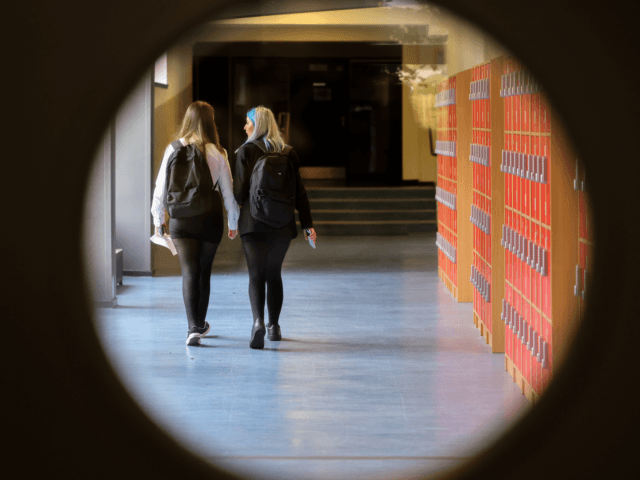Facial recognition systems have been implemented in British schools under the guise of the Chinese coronavirus pandemic.
Using the excuse of speeding up lunch line queues and being more “Covid-secure” than card payments or fingerprint scans, nine schools in the North Ayrshire council of Scottland began scanning the faces of young pupils to process payments on Monday.
The managing director of CRB Cunninghams — the firm which installed the systems — David Sawnston told the Financial Times: “It’s the fastest way of recognising someone at the till — it’s faster than card, it’s faster than fingerprint.”
“In a secondary school, you have around about a 25-minute period to serve potentially 1,000 pupils. So we need fast throughput at the point of sale,” he added, claiming that transaction times were cut down to five seconds per student under the facial identification system.
Swanston argued that his facial recognition system is different from live recognition, as it doesn’t scan through a crowd to identify faces but rather compares a face to encrypted pictures on file at the school. He revealed that so far, 65 schools throughout the UK have signed up to have it installed.
Privacy campaigners have warned that while there are already biometric systems, such as fingerprint sensors, in many British schools, it is wrong to normalise facial recognition in schools.
“It’s normalising biometric identity checks for something that is mundane. You don’t need to resort to airport-style [technology] for children getting their lunch,” said Big Brother Watch’s Silkie Carlo.
The Biometrics Commissioner for England and Wales, Fraser Sampson criticised the decision to implement facial recognition in schools, arguing that “if there is a less intrusive way, that should be used.”
The local council claimed that 97 per cent of parents or children had consented to the invasive system, claiming that students often forget their PINs and card systems are open to fraud. Some parents questioned whether students were provided with enough information to make such a decision, however.
Facial Recognition Vaccine Passports Being Developed by British Tech Firms https://t.co/EIeyAvjVPo
— Breitbart London (@BreitbartLondon) March 27, 2021
During the Chinese coronavirus crisis, facial recognition and other Orwellian systems, such as vaccine passports have increasingly become the norm in British life.
While England has so far been spared from mandatory vaccine passports, the NHS app has been used as a defacto vaccine passport for those travelling abroad.
The app, which uses facial recognition as one of the means of identity verification has already raised privacy concerns after it was revealed that data, including facial scans, have been shared with the police.
Last week, the government’s cabinet minister, Stephen Barclay announced that it would be using facial recognition and fingerprint verification for a new gov.uk app which will give access to citizens to over 300 state services.
Barclay argued that during the Chinese coronavirus crisis, citizens have come more accustomed to using digital services and therefore the government will seek to expand its digital arm into the lives of the public.
In August, the Home Office published new advice for police on the use of artificial intelligence-based facial recognition systems across the country, arguing that the dystopian tech will be necessary to ensure the safety of the public.
Definitely Not Authoritarian: Britain to Introduce Facial Recognition App for Government Services https://t.co/LRVGUsgSL9
— Breitbart London (@BreitbartLondon) October 14, 2021
Follow Kurt Zindulka on Twitter here @KurtZindulka

COMMENTS
Please let us know if you're having issues with commenting.